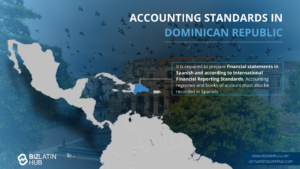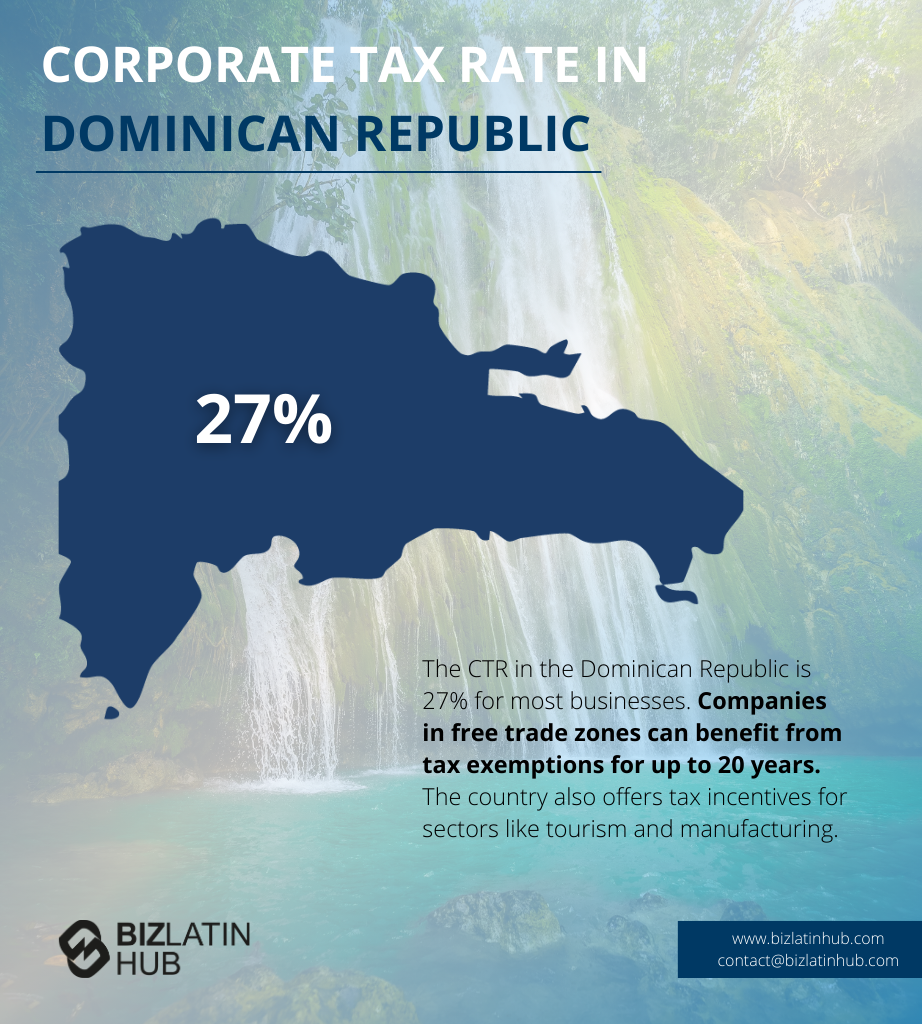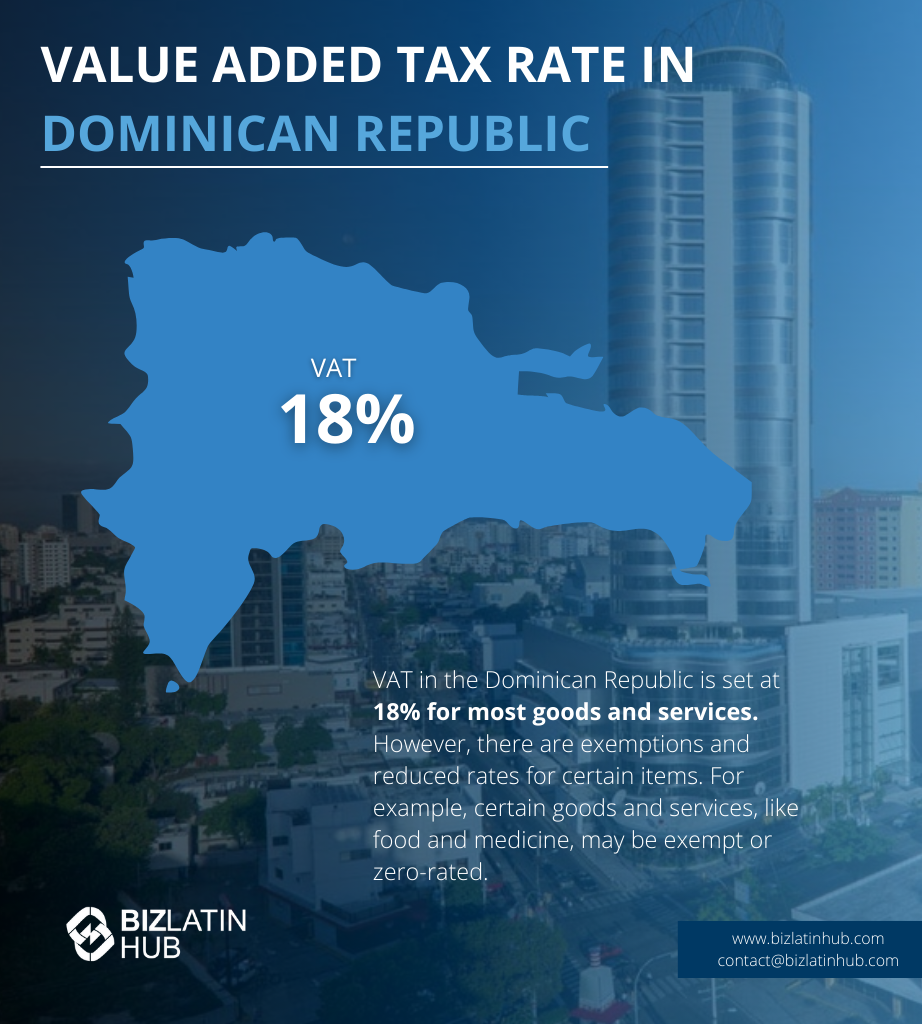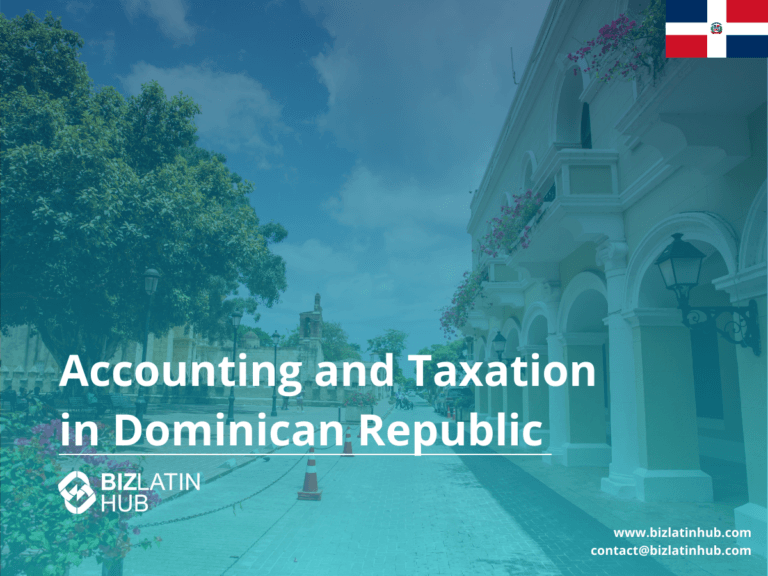Accounting in the Dominican Republic plays a fundamental role in your market entry strategy, ensuring proper company incorporation and compliance with its detailed regulatory framework. This guide provides vital information to help you handle your fiscal requirements effectively and compliantly with the Dirección General de Impuestos Internos (DGII) that oversees tax compliance, corporate tax filings, VAT returns, and UBO registration. Biz Latin Hub offers professional support to navigate the country’s accounting standards after you incorporate a company in the Dominican Republic. This guide explains the specific tax obligations overseen by the DGII, including the critical system of Fiscal Receipt Numbers (NCF).
Key Takeaways On Accounting in the Dominican Republic
| What Are The Accounting Standards in the Dominican Republic? | It is required to prepare financial statements in Spanish and according to International Financial Reporting Standards. Accounting registries and books of account must also be recorded in Spanish. |
| What Is The Corporate Tax Rate in the Dominican Republic? | The corporate tax rate in the Dominican Republic is set at 27%. |
| What Is The Dominican Republic’s Value Added Tax Rate? | ITBIS is the local Value Added Tax, set at 18%. |
| Dividend Tax Rate in the Dominican Republic | There is a 10% withholding tax on dividends and profits remitted abroad. |
| Is there an asset tax? | Tax on Assets is 1% of taxable assets. |
| Can the process be done online? | Filings are managed through the DGII Virtual Office. |
Overview of the Dominican Republic’s Tax and Accounting Framework
The Directorate General of Internal Taxes (DGII) is the main tax authority in the Dominican Republic. Tax obligations and rights are established by law and are allocated based on the taxpayer’s turn on activities. These are provided from registration to the National Taxpayer Registry (RNC) and must be presented on the established dates.
In the Dominican Republic, there are several tax requirements that companies doing business in the country must take into account, such as:
- IR2- Annual Affidavit of Corporate Income Tax (ISR): Companies that receive income during the financial year must pay 27% on taxable income from legal entities domiciled in the country, this excludes rebates.
- IR1- Annual Affidavit of Personal Income Tax: Self-employed people who received an income through personal work or commercial activities must file for the deadline of March 31st each year.
- ACT-Taxable Assets: Applicable property assets are taxed by 1% on the total value of the property held by the taxpayer. The tax payable must be paid in two equal installments.
- ITBIS-Tax on the Transfer of Industrialised Goods and Services (VAT): 18% tax on the transfer of goods and services. VAT is known as ITBIS, or Impuesto sobre Transferencia de Bienes Industrializados y Servicios, and is the country’s equivalent.
- IR3- Statement of Employee Withholdings: Tax is to be paid by withholding agents, who are individuals or public and private entities obligated to carry out the corresponding withholding when paying salaries and/or any other cash remuneration to their employees. The withholding rates are progressive, ranging from 15%, 20%, and 25%. Declarations must be made within the first 10 days of each month.
- IR-17 Withholding and additional Remuneration: Payment of other withholdings that companies make each month.
- SC2-Consumer Selective, IST-Selective Telecommunication Tax, and DSS-Selective Insurance: These three declarations must be submitted no later than 20 days of each month. This addresses the industries that sell tobacco, alcohol or telecommunications-related companies.
Other tax requirements in the Dominican Republic also include:
- 10% income tax (ISR) on prizes on winnings made on slot machines.
- 10% income tax (ISR) on winnings made on the lottery and sports bets.
- ISF: Declaration Affidavit Non-Profit Institutions.
- CD-Corruptions Output.

UBO Registration and Anti-Money Laundering Laws
Companies must declare their Ultimate Beneficial Owners (UBOs) to the DGII, disclosing full names, ID numbers, ownership percentages, and control rights. This must be updated within 30 days of changes. Non-compliance may result in fines and suspension of tax status.
Accounting Requirements for the Purchase of Goods and Services

Executives who intend to purchase goods and services in the Dominican Republic must also be aware of the corresponding accounting and tax requirements. Note that there are different formats used to certify that these activities were carried out in full compliance with local regulations, such as:
- Format 606: Used to report the purchase of goods and services that include the tax receipt number. This must be submitted within the first 15 days of each month.
- Format 607: This format is submitted to declare sales of taxpayers goods and services that include the tax proof number.
- Format 608: Used to send canceled invoices.
- Format 609: This is a format presented for taxpayers who make a payment from abroad.
Likewise, note that International Accounting Standards (IAS) and their interpretations in Spanish will apply as mandatory standards in the Dominican Republic. These accounting requirements must be taken into account for the following cases:
- IAS 1: Presentation of Financial Statements.
- IAS 2: Stocks or Inventories.
- IAS 7: Statement of Cash Flows.
- IAS 8: Accounting Policies, Changes in Accounting Estimates and Errors.
- IAS 12: Income Tax.
- IAS 16: Property and Plant equipment.
- IAS 17: Leases.
- IAS 19: Remuneration to Employees.
Deadlines for tax filing
You must be aware of the relevant filing deadlines in order to stay compliant in the Dominican Republic. CIT (IR-2) is due annually by April 30 whereas VAT (IT-1) must be filed monthly by the 20th. Dividend tax (IR-17) is also monthly but with advance filing.
Tax Incentives for Investors and Free Zones
Dominican Republic free trade zones can be found in the borderzone near the frontier with Haiti, inside or nearby air and seaports, and in both rural and urban areas. In some cases, they are focused on a particular type of business, which their location is related to, with many companies in the country’s massive call centre industry based in urban free trade zones.
In the border areas, companies are often allowed to operate outside of the zones. Dominican Republic free trade zones can be privately or publicly owned, while in some cases a mixed ownership model is in place. Public parks are most often managed by ProIndustria. Meanwhile private free trade zones are overseen by a particular private company or a group of private actors.
There are also schemes to promote investment through CONFOTUR (tourism law), and in renewable energy. These may include 100% exemption from income tax, VAT, and import duties for up to 15 years. Applications are handled by CNZFE and ProDominicana, depending on the regime.
Payroll Contributions and TSS Compliance

Employers must register with the TSS and submit electronic payroll data monthly through the official platform. Payroll contributions must match DGII tax filings and comply with all local regulations.
Employee deductions:
Under employment law in the Dominican Republic, deductions are made from employee salaries for the state pension fund (AFP) and public health insurance fund (SFS), totalling 5.92% of their salary.
Those are broken down into a 2.87% deduction for the AFP and a 3.04% deduction for the SFS.
Employer contributions
Employer contributions to the AFP and SFS, as well as for occupational health insurance, total a minimum of 15.34% of the value of the salary being paid.
Those are broken down into a 7.1% contribution to the AFP, a 7.09% contribution to the SFS, and a 1.25% contribution for occupational health, with up to an additional 0.6% based on the level of risk involved in the job.
Profit sharing
Employers are legally obliged to share 10% of net annual profits with their employees, and the payment must be made within a period of between 90 and 120 days following the end of the fiscal year, which in the Dominican Republic closes on December 31. That means that profit shares will generally be paid during the month of April.
For workers who have provided less than five years of service to the company, their profit share cannot exceed the equivalent of 45 days of salary, while for those who have provided more than five years of service, it should not exceed the equivalent of 60 days of salary.
Note that the following types of companies are exempted from sharing profits:
- Companies working in agriculture, forestry, and mining that have been in operation for less than three years
- Agricultural companies whose capital does not exceed one million Dominican pesos (approximately USD$18,000 as of November 2021)
- Companies based in free trade zones
The Role of the DGII
The Directorate General of Internal Revenue (DGII) is the tax authority. Companies must register to obtain an RNC (Tax ID) and request authorization to issue NCFs (Fiscal Receipt Numbers) to operate legally.
Expert Tip: Understanding NCF Types
From our experience, the most confusing aspect for new investors is the NCF (Número de Comprobante Fiscal) system. You cannot just issue an invoice; you must use a specific government-authorized sequence number.
Crucially, there are different types of NCFs: one for clients who need tax credit (Type 01) and one for final consumers (Type 02). If you issue a Consumer invoice to a corporate client, they cannot use it to deduct costs, which causes commercial friction. We advise automating this in your billing software to ensure the correct NCF series is always used.
FAQs About Tax and Accounting in the Dominican Republic
Based on our extensive experience these are the common questions and doubts from our clients when looking to understand accounting and taxation in the Dominican Republic.
The corporate tax rate in the Dominican Republic is 27%.
Businesses in the Dominican Republic are taxed according to the IFRS, which works on the basis of paying tax on the difference between revenue minus deductible expenses.
The IRS in the Dominican Republic is called the Dirección General de Impuestos Internos (DGII) and it is responsible for implementing the fiscal and customs legislation in Dominican Republic.
Dominican accounting standards require companies to prepare their financial statements in Spanish and according to International Financial Reporting Standards. Accounting registries and books of account must be recorded in Spanish.
The equivalent of a CPA in the Dominican Republic is a certified public accountant (Contador Publico Autorizado—CPA).
Yes it does. Dominican accounting standards require companies to prepare their financial statements in Spanish and according to International Financial Reporting Standards.
The VAT, known locally as ITBIS, is charged at 18%. A reduced rate of 16% applies to essential goods and services. Businesses must file ITBIS returns by the 20th of each month using Form IT-1 via the DGII’s Virtual Office. Electronic invoicing is being phased in, with compliance required by sector under DGII Resolution 01-2023.
Employers contribute 14% of gross salary: 7.1% to pensions, 7.09% to health, and 1.2% to occupational risk insurance. Employees contribute 5.91%. Payroll must be processed through the Tesorería de la Seguridad Social (TSS) and integrated with DGII filings, using an electronic payroll system.
Yes. Companies must declare their Ultimate Beneficial Owners (UBOs) to the DGII, disclosing full names, ID numbers, ownership percentages, and control rights. This must be updated within 30 days of changes. Non-compliance may result in fines and suspension of tax status.
Incentives exist for businesses in Free Zones, under CONFOTUR (tourism law), and in renewable energy. These may include 100% exemption from income tax, VAT, and import duties for up to 15 years. Applications are handled by CNZFE and ProDominicana, depending on the regime.
This is a 1% tax levied on the company’s taxable assets. It acts as a minimum tax; if the calculated ISR (27% of profit) is higher than the Asset Tax, you only pay the ISR. If the Asset Tax is higher (e.g., if the company made a loss), you pay the Asset Tax.
These are Simplified Tax Regimes available for small businesses and certain service providers, offering simplified filing requirements.
Why Invest in the Dominican Republic?
The Dominican Republic attractiveness for investment is driven by its diverse economy and strategic location. As the largest economy in the Caribbean, the country benefits from an established tourism industry, and manufacturing. The government has proactively implemented reforms to foster a favorable business environment, offering tax incentives and a stable legal framework for foreign investors. With proximity to the United States and strong trade agreements, such as the Central America-Dominican Republic Free Trade Agreement (CAFTA-DR), the country offers access to a vast consumer market and export opportunities.
In addition to its strong economic performance, the Dominican Republic also offers advantages in sectors such as renewable energy and real estate, and agriculture. Its favorable climate and fertile land support agricultural production, making it an important player in the export of products like sugar, coffee, and cocoa. The country’s increasing demand for renewable energy infrastructure also presents opportunities in solar, wind, and hydroelectric projects.
Biz Latin Hub Can Help With Accounting and Tax Requirements in the Dominican Republic
Understanding taxation and accounting requirements in the Dominican Republic will make it easier for you to budget. Additionally, it will help you understand what you will have to deal with when it’s time to declare your taxes.
If you would like more information about accounting regulations or tax laws in the Dominican Republic, Biz Latin Hub’s group of experts offer you legal and accounting assistance for your business in Bolivia. Take advantage of our large range of multilingual market entry and back-office business solutions to meet your company’s incorporation and compliance needs.
Contact us now for help in establishing a successful business in the Dominican Republic.
Learn more about our team and expert authors.






